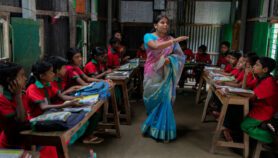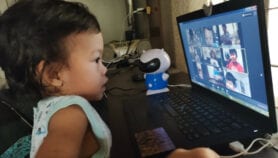By: Alex Cheung
Send to a friend
The details you provide on this page will not be used to send unsolicited email, and will not be sold to a 3rd party. See privacy policy.
The One Laptop Per Child (OLPC) initiative is launching a ‘Give 1 Get 1’ scheme in North America, encouraging individuals to buy two of their low-cost laptops — one for their own child and one for a child in the developing world.
OLPC hopes that the programme, open for two weeks from 12 November, will stimulate interest in their initiative in both developing and Western countries.
The non-profit OLPC aims to provide low-cost computers for education in developing countries. Its XO computer, previously dubbed the ‘$100 laptop’, currently costs more than that, with OLPC hoping that mass production will drive down the cost.
“The goal now is to get purchase orders from governments,” OLPC spokesperson Jackie Lustig told SciDev.Net.
OLPC founder Nicholas Negroponte has said orders so far have been “disappointing”, with promised orders from Brazil and Nigeria failing to materialise, according to the BBC.
Under the ‘Give 1 Get 1’ scheme, customers pay US$399 for two XO laptops, receiving one whilst another is delivered to a child in the developing world.
Focus groups carried out by OLPC suggest that the XO laptop could prove popular in Canada and the United States.
“The kids loved them because it’s the first time a laptop is designed specifically for a child,” says Lustig.
The computer addresses the needs of children in developing countries, featuring, for example, a high resolution screen which can be read in full sunlight.
But the OLPC initiative itself is still facing criticism.
Tim Unwin, founder of the Information and Communication Technologies for Development (ICT4D) Collective, which aims to encourage the appropriate and sustainable use of ICT for development, said the scheme was “fundamentally flawed”.
While Unwin commends the technology behind the XO laptop, he sees it as “a technological solution in search of a problem”.
Unwin says the lack of training for teachers and the widespread shortage of internet connectivity in many developing countries are major issues neglected by the OLPC. “You need to have an integrated strategy rather than just giving a laptop per child,” he says.
He adds that newer technologies may be more appropriate to the developing world. “The convergence of laptops and mobile phones is going to change the rules of the game. There are people already making digital devices much cheaper than the OLPC.”












